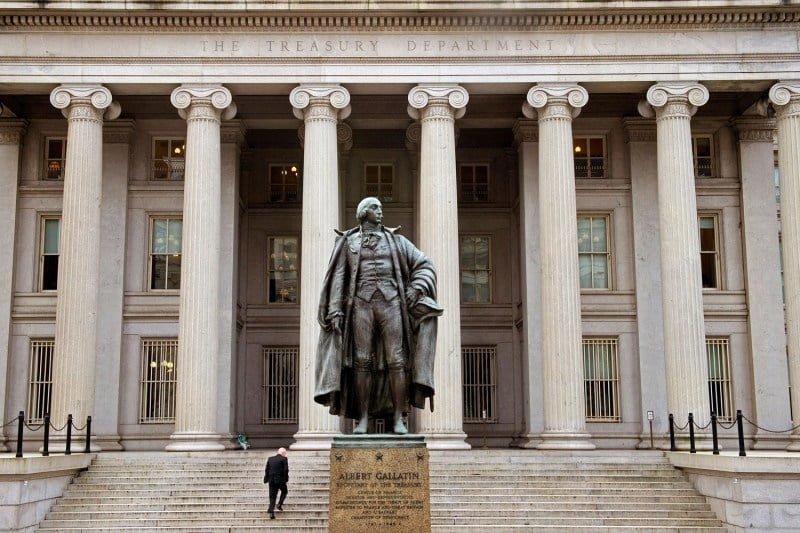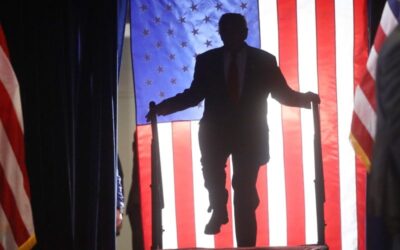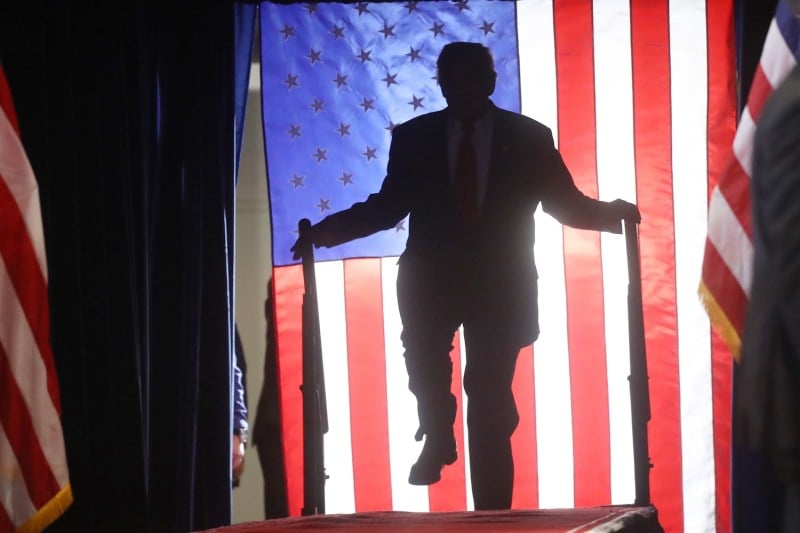Another Anti-Corruption Pillar Crumbles

Another Anti-Corruption Pillar Crumbles
Not enforcing the Corporate Transparency Act makes life harder for U.S. businesses—and easier for drug traffickers.
A man enters the U.S. Treasury Department building on Pennsylvania Avenue in Washington, DC, on Jan. 24, 2017. Paul J. Richards/AFP via Getty Images
“I can look into it,” Elon Musk posted on X on March 1. He was responding to a comedian named Terrence K. Williams who had written, “ELON MUSK!!! I’m begging you! Please ask President Trump to get rid of this ridiculous BOI rule that Biden Created It’s targeting conservatives and small businesses!” As part of the post, Williams claimed that he had received an email saying he needed to fill out a beneficial ownership report or be fined more than $500 per day and risk prison time.
The exchange seems to have been the impetus for a major change in U.S. anti-money laundering and countering the financing of terrorism (AML/CFT) policy. The shift has caused regulatory chaos, especially for small businesses in the United States.
“I can look into it,” Elon Musk posted on X on March 1. He was responding to a comedian named Terrence K. Williams who had written, “ELON MUSK!!! I’m begging you! Please ask President Trump to get rid of this ridiculous BOI rule that Biden Created It’s targeting conservatives and small businesses!” As part of the post, Williams claimed that he had received an email saying he needed to fill out a beneficial ownership report or be fined more than $500 per day and risk prison time.
The exchange seems to have been the impetus for a major change in U.S. anti-money laundering and countering the financing of terrorism (AML/CFT) policy. The shift has caused regulatory chaos, especially for small businesses in the United States.
Less than 24 hours after Musk made his promise to Williams, the U.S. Treasury Department sent out a series of five X posts stating that the agency would not enforce any “penalties or fines against U.S. citizens or domestic reporting companies or their beneficial owners” with regards to adherence to the Corporate Transparency Act (CTA). The act, passed during the first Trump administration with overwhelming bipartisan support as part of the 2021 National Defense Authorization Act, requires companies to identify who ultimately owns and/or controls them and bans the formation of anonymous shell companies in the United States. Shortly after the Treasury posts, President Donald Trump jumped on Truth Social to say:
Exciting news! The Treasury Department has announced that they are suspending all enforcement of the outrageous and invasive Beneficial Ownership Information (BOI) reporting requirement for U.S. Citizens. This Biden rule has been an absolute disaster for Small Businesses Nationwide. Furthermore, Treasury is now finalizing an Emergency Regulation to formally suspend this rule for American businesses. The economic menace of BOI reporting will soon be no more.
The CTA is one of the most important AML/CFT laws passed in decades, and while experts are still parsing out the full implications of its rollback, so far at least four key issues stand out.
First, lifting the enforcement of this law undermines anti-money laundering efforts, puts the United States out of compliance with international anti-money laundering standards, and even undermines some of Trump’s other executive orders.
While the rules governing the CTA were indeed written during the Biden administration, the law itself was passed after Congress overrode Trump’s veto. Its passage had been a priority for law enforcement groups such as the Fraternal Order of Police and good governance advocates for decades. Trump’s first treasury secretary, Steve Mnuchin, testified to the House in 2019 in favor of the CTA, and then-Sen. Marco Rubio (now Trump’s secretary of state) spoke in strong support of it in 2018. The ability to form anonymous shell companies has been a major reason why the United States was long considered the easiest place in the world to launder money.
Getting the CTA passed had been a bipartisan—but nonetheless decades-long—endeavor. The war on drugs and the fight against terrorism finance, especially after the 9/11 attacks, had shown a spotlight on the role that shell companies could play in undermining U.S. national security. Meanwhile, leaks of documents from auditing and law firms including the 2014 Luxembourg Leaks, 2016 Panama Papers, and 2021 Pandora Papers further highlighted the role that anonymous shell companies played in a host of illicit activities that were facilitating drug trafficking, sanctions evasion, corruption, and myriad other crimes. A 2012 study found that U.S. corporate service providers offered some of the easiest ways to set up anonymous shell companies, even when those seeking to open shell companies displayed significant red flags for possible ties to terrorism. By 2016, the United States—formerly a leader in anti-money laundering legislation—was out of compliance with international standards. Countering lobbying from the National Association of Secretaries of State and various business lobbies, law enforcement bodies such as district attorneys and police organizations tipped the balance of support toward enacting the legislation, with the CTA finally passed on Jan. 1, 2021.
U.S. efforts at beneficial ownership legislation largely mimicked European efforts, albeit with a lag. The European Union as well as more than 100 other countries either require or are implementing beneficial ownership registries for businesses. Yet, despite its national security importance and international AML/CFT standards, the CTA never entirely shook off its detractors. The Heritage Foundation’s Project 2025, in its Treasury Department chapter, advocates for the law’s repeal and a review of all AML/CFT legislation and rules. As the comedian Williams pointed out, there were also concerns over the cost and time to input company beneficial ownership information, plus privacy concerns. In a standard limited liability company, however, providing basic information on a company beneficial owner is a simple matter and requires basic information such as the names of the owners and that of the business, the address, and the owners’ dates of birth. The Treasury Department estimated that it would only take 90 minutes to register companies with simple beneficial ownership structures; I was able to register the beneficial ownership of my own limited liability company in about 15 minutes.
Moreover, until a few days prior, the Trump administration had still been defending the CTA in court, with the National Small Business Association filing a series of lawsuits against it. To say that this freeze on nearly all CTA enforcement is a surprise is thus an understatement.
Freezing the CTA puts the United States grossly out of compliance with Financial Action Task Force (FATF) standards. The United States is due to be evaluated for its compliance in early 2026, and failing could land it on the FATF gray list as a jurisdiction requiring additional AML/CFT monitoring. Should the United States join countries such as Syria, Venezuela, and Mali on the gray list, American individuals and businesses will find it harder to do international transactions, especially banking.
Not only is this change in policy undermining the U.S. fight against money laundering, but it is also undermining the Trump administration’s own executive orders. For example, a Feb. 4 order about sanctions on Iran called for the FATF to evaluate beneficial ownership thresholds to constrain Iran from using shell companies and similar financial machinations used to avoid sanctions. But how can that happen if the United States—the country that incorporates the most companies in the world—will no longer gather hardly any beneficial ownership information? This rule undermines a host of other Trump priorities, such as fighting fentanyl trafficking, since narcotraffickers often use anonymous shell companies to launder their funds. It is also out of keeping with the feelings of Trump’s voter base: A recent survey by a conservative polling firm found that 81 percent of respondents agreed that small businesses doing 20 minutes of beneficial ownership paperwork was acceptable in order to fight “drug trafficking, terrorist financing, and other financial crimes.”
It is the executive branch’s job to enforce the laws, but the Trump administration has increasingly decided not to. The Treasury Department on March 2 announced a new rulemaking whereby only foreign reporting companies will be required to declare their beneficial owners. This “interim final rule” came into effect on March 26 concurrently with the public comment period on the new rule. But Congress specifically legislated that nearly all companies—foreign and domestic—must declare their beneficial owners. Assuming the interim final rule continues to hold, more than 99 percent of companies will continue to be exempt from the CTA statute.
Another law within a similar subject area—the Foreign Corrupt Practices Act (FCPA)—is likewise not being enforced, at least in theory. Nonetheless, despite the enforcement freeze, jury selection has begun for two executives charged under the FCPA for paying bribes to Indian officials, making an already confusing legal situation even more chaotic. Individuals and businesses are increasingly finding themselves in a no-win situation.
The full ramification of this bizarre policy shift is still being sorted out, but the resulting havoc will continue.
This post is part of FP’s ongoing coverage of the Trump administration. Follow along here.
Jodi Vittori is a professor of the practice and co-chair of global politics and security at Georgetown University’s School of Foreign Service.
More from Foreign Policy
-

An illustration shows a golden Cybertruck blasting through a U.S. seal of an eagle holding arrows and laurel. Is America a Kleptocracy?
Here’s how life could change for the rich, poor, and everyone in between.
-

The flag of the United States in New York City on Sept. 18, 2019. America Is Listing in a Gathering Storm
Alarms are clanging at the U.S. geographic military commands around the globe.
-

U.S. President Donald Trump shakes hands with Supreme Court Chief Justice John Roberts during Trump’s inauguration in Washington, D.C. The U.S. Judicial Crisis Is Uniquely Dangerous
But other democracies provide a roadmap for courts to prevail over attacks from the executive branch.
-

An illustration shows a golden Newtons cradle with Elon Musk depicted on the one at left and sending a globe-motif ball swinging at right. Elon Musk’s First Principles
The world’s richest man wants to apply the rules of physics to politics. What could go wrong?








Join the Conversation
Commenting on this and other recent articles is just one benefit of a Foreign Policy subscription.
Already a subscriber?
.
Subscribe
Subscribe
View Comments
Join the Conversation
Join the conversation on this and other recent Foreign Policy articles when you subscribe now.
Subscribe
Subscribe
Not your account?
View Comments
Join the Conversation
Please follow our comment guidelines, stay on topic, and be civil, courteous, and respectful of others’ beliefs.
Change your username |
Log out
Change your username:
CANCEL
Confirm your username to get started.
The default username below has been generated using the first name and last initial on your FP subscriber account. Usernames may be updated at any time and must not contain inappropriate or offensive language.